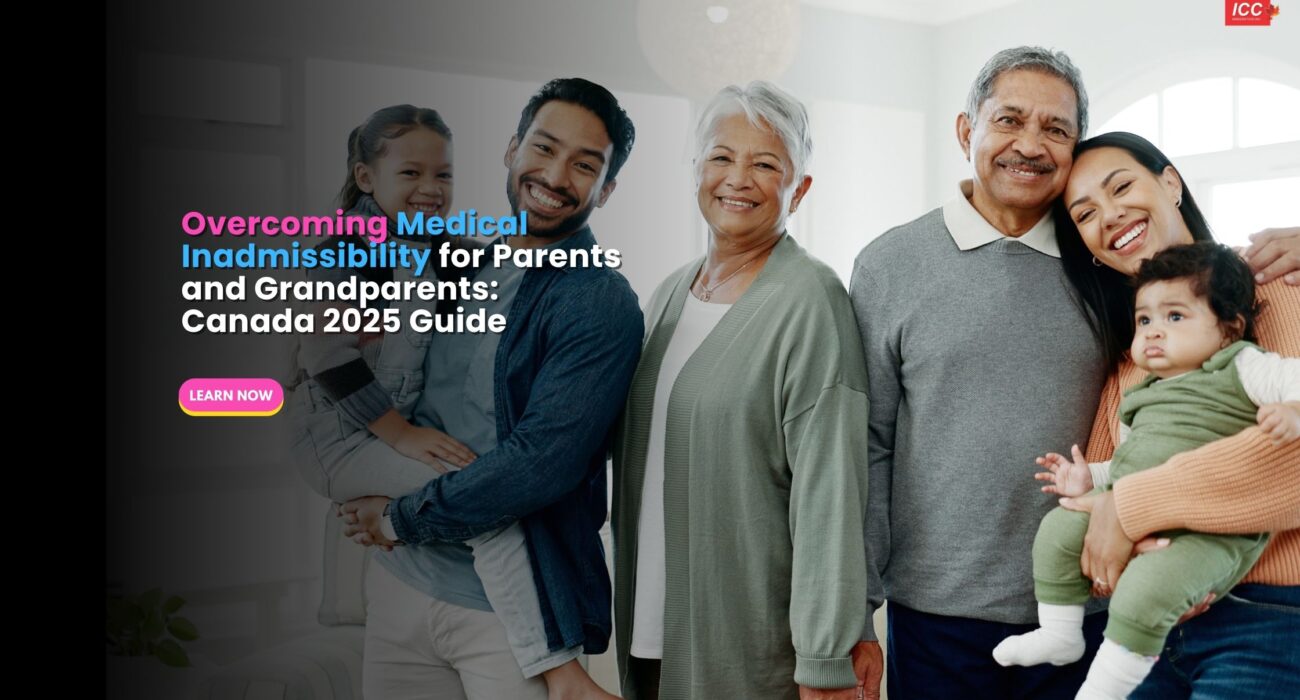Bringing your parents or grandparents to Canada under the Parents and Grandparents Program (PGP) or on a super visa is a dream for many families. However, one major challenge applicants face is medical inadmissibility. If Immigration, Refugees and Citizenship Canada (IRCC) determines that your parent or grandparent’s health condition could pose an excessive demand on Canada’s health or social services, their application may be refused.
In this article, we explain what medical inadmissibility means, how to avoid a refusal, and what options exist to overcome this challenge.
What is Medical Inadmissibility in Canada?
Under Canadian immigration law, IRCC can refuse an application if a person’s health condition is likely to:
-
Pose a danger to public health
-
Pose a danger to public safety
-
Cause excessive demand on health or social services
For most family sponsorship cases, the last factor—excessive demand—is the main concern.
For 2025, the excessive demand cost threshold is $27,162 per year or $135,810 over five years. If IRCC believes that medical treatment, medication, or long-term care for your parent or grandparent will exceed this limit, they may be deemed medically inadmissible.
Common Health Conditions That Raise Concerns
While every case is assessed individually, some conditions often flagged for excessive demand include:
-
Chronic diseases like diabetes or kidney disease
-
Cardiac conditions
-
Autoimmune diseases such as AIDS or Lupus
-
Neurological disorders including cerebral palsy or brain disorders
-
Cancer
-
Psychiatric conditions like schizophrenia or bipolar disorder
-
Hepatitis B or C
-
Tuberculosis
-
Developmental or learning disabilities requiring special care
Having one of these conditions does not automatically mean refusal, but you must provide strong evidence that your parent or grandparent’s health is stable and managed effectively.
How to Reduce the Risk of Medical Inadmissibility
If your parent or grandparent has a chronic condition, take these steps to strengthen your application:
✔ Submit complete medical records showing that the condition is well-managed.
✔ Provide doctor’s reports and treatment plans demonstrating stability.
✔ Show that medications or therapies are affordable and accessible, possibly through private insurance.
Being proactive reduces the likelihood of IRCC concluding that your parent or grandparent will impose an excessive financial burden on Canada’s healthcare system.
What If IRCC Issues a Procedural Fairness Letter?
If IRCC suspects medical inadmissibility, they will send a procedural fairness letter before making a final decision. This is your opportunity to respond, usually within 90 days.
Your response should include:
-
Updated medical reports and treatment details
-
Proof of medication cost management (e.g., switching to more affordable options)
-
Evidence of private health insurance coverage
Mitigation Plan
Sometimes, IRCC allows applicants to submit a mitigation plan explaining how they will handle health-related expenses without burdening Canadian resources. This plan must show:
-
How services will be obtained and funded
-
Evidence of financial ability to pay for these services
-
A signed Declaration of Ability and Willingness to cover these costs
Temporary Resident Permit (TRP)
If PR or a super visa is refused due to medical inadmissibility, your parent or grandparent can still apply for a Temporary Resident Permit (TRP). A TRP allows entry for a limited period if there is a compelling reason to visit.
Parents and Grandparents Program (PGP) and Super Visa
The PGP allows Canadian citizens and permanent residents to sponsor their parents and grandparents for permanent residence. Due to high demand, IRCC uses a lottery system for invitations. For 2025, IRCC will accept 10,000 applications and is sending 17,860 invitations to those who expressed interest in 2020.
If you are not selected, a super visa is an alternative. This visa allows parents or grandparents to stay for up to five years per visit and is valid for 10 years. Applicants must purchase private health insurance and meet IRCC’s admissibility criteria.
How ICC Immigration Can Help You Overcome Medical Inadmissibility
Dealing with medical inadmissibility or PGP sponsorship can be stressful, but ICC Immigration is here to guide you through every step.
Here’s how we help:
✅ Permanent Residency Applications: From PGP sponsorship to alternative pathways like Express Entry or PNPs, we ensure compliance with IRCC rules.
✅ Work and Study Permits: If PR is delayed, we help your family explore temporary options leading to PR.
✅ Family Sponsorship: We specialize in reuniting families in Canada, even in complex cases.
✅ Expert Legal Advice: Our experienced team helps respond to procedural fairness letters, prepare mitigation plans, and submit strong applications to avoid refusals.
Instead of leaving your future to chance, work with professionals who understand Canada’s immigration system inside out.




